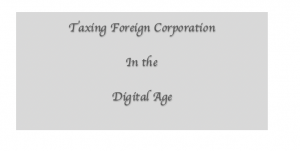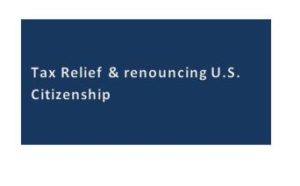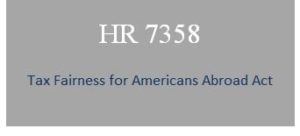A recent report (the “Report”) from The Treasury Inspector General for Tax Administration (“TIGTA”) addressing Non-Filing and Non-Reporting Compliance under the Foreign Tax Compliance ACT (“FATCA”), the Senate Finance Committee’s recent findings related to the use of shell banks to avoid detection by the Internal Revenue Service and increased funding in connection with Inflation Reduction Act (“IRA”) spell trouble for those who have yet to file Form 8938 (“Statement of Specified Foreign Financial Assets”) or FinCEN Form 114, commonly referred to as an “FBAR.”
Taxpayers who have failed to file Form 8938 and/or those who have failed to file FBARS may feel that they have successfully avoided detection by the Internal Revenue Service. There are even some Expats who have concluded, given the amount of time that has passed, that the IRS has forgotten about them or that they are unwilling or incapable of chasing down delinquent Non-Compliant Taxpayers.
The following discussion addresses problems associated with the effective implementation of FATCA and FBAR enforcement efforts, recommendations by TIGTA and the impact increased funding from the IRA will have on the overall effectiveness of these efforts. The discussion follows also addresses problem identified by the Senate Finance Committee with respect to the use of shell companies as a means of avoiding IRS detection of overseas tax evasion. These recent developments should serve as a wakeup call for those who have yet to come into compliance.
Citing lack of resources and other failures on the part of the IRS, the TIGTA Report concludes that the IRS has significantly departed from its original FATCA Compliance Roadmap finalized in 2016 in favor of more limited compliance initiatives. The Report further states that despite spending $573 million dollars on FATCA compliance through fiscal years 2020, the IRS has taken limited or no action with respect to the objectives and initiatives outlined in its FATCA Compliance Roadmap. Instead, the IRS opted to focus on narrower strategy embodied in two Campaigns.
Specifically, TIGTA evaluated two Campaigns established by the Large Business and International (“LBI”) division of the Internal Revenue Service including Campaign 896 (“Offshore Private Banking Related to Individual Taxpayers”) and Campaign 975 (“FATCA Accuracy”).
Campaign 896, which is no longer active, focused solely on Taxpayers who filed Forms 8938, but underreported their foreign assets. The Report also noted that the IRS was in the planning stages of identifying those Taxpayers, who have failed to file Form 8938. The Report cites recent IRS data, which estimates that there are over 330,000 U.S. Taxpayers with foreign accounts over $50,000 who has not filed Form 8938. The IRS data further suggests that this pool of Taxpayers would each owe a minimum of $10,000 in FATCA related penalties and that the total penalties would result in $3.3 billion in penalties.
IRC Section 6038D requires U.S. Taxpayers who meet the filing threshold to report their specified foreign financial assets to the IRS. If the aggregate value of the assets exceed certain dollar threshold, this reporting requirements is satisfied when a U.S. Taxpayer files Form 8938 together with his or her Federal Tax Return. Specified foreign financial assets include Foreign Financial Accounts (“FFA’s”), stocks, securities, financial instruments and contracts issued by a person other than a U.S. Person as well as any interest in a foreign entity.
For its part Foreign Financial Institutions (“FFI’s) are required to file Form 8966 (“FATCA Report”). The objective of Campaign 975 is to identify FFI’s that maintain FFA’s for U.S. Specified Persons, but did not submit Form 8966 on the accounts they hold on behalf of U.S. individuals. The LB&I Division then matches Forms 8938 with Forms 8966, and in certain cases, Forms 1099.
In order to avoid being subject to the 30% on U.S. Source payment received made to them, FFI’s are required to register and agree to report certain information about their accounts owned by U.S. taxpayers including the accounts of foreign entities with substantial ownership. This information is reported on Form 8966. If the FFI fails to certify, it may be subject to termination of the entity’s FATCA status and result in the entity’s Global Intermediary Identification Number (“GIIN”) being removed from the FFI list. Should this occur the FFI would then be subject to the 30% withholding.
In addition to the TIGTA report, the findings by the Senate Finance Committee (the “Committee”), Chair, Ron Wyden, entitled: “The Shell Bank Loophole” together with the indictment of Robert T. Brockman on 39 counts, including tax evasion, failure to file foreign bank account reports, money laundering and other offenses further highlight problems with the effective implementation of FATCA compliance and the enforcement challenges by the U.S. Government with respect to the pervasive use of shell companies. The findings conclude with a recommendation that the IRS needs to focus on increased scrutiny and that funds from the IRA should be use in this regard.
As part of its findings the Committee conducted a case study on the allegations against Robert T. Brockman that he concealed $2.7 billion in income from the IRS and evaded hundreds of millions of dollars in Federal Income Taxes. In this regard, the Committee focused its attention on defects in FATCA’s regulatory framework, and a loophole utilized by Brockman in order to carry out its nefarious scheme.
FFI’s must registered with the IRS and are required to identify and report certain information about U.S. accounts. For purposes of implementing these requirements the United States has entered into Intergovernmental Agreements (“IGA’s”) with foreign partner jurisdictions addressing a number of issues including whether and to what extent an FFI is required to determine if an account is held by a U.S. Person. In cases where an account holder is believed to be a non U.S. financial institution in a partner jurisdiction and where the IRS has issued the account holder a Global Intermediary Identification Number (“GIIN”), depending upon the particular IGA, no further review, identification or reporting is required with respect to the account. The foregoing is applicable to Swiss Banks as well as others.
According to the Committee’s Report, Brockman and his associates were able to exploit the shell bank loophole, by turning these shell companies into IRS approved financial institutions capable of self-certifying their offshore accounts to the IRS. Under the current system, a U.S. Taxpayer is able to create an offshore shell company and register that company with the IRS. By registering with the IRS as a financial institution, the shell company operates as a shell bank and is able to self-certify reporting its offshore accounts for FATCA purposes.
According to the Committee findings and the indictment, Brockman and his associates opened up accounts in Switzerland using entities that had approved GIIN numbers approved and issued by the IRS for purposes of FATCA reporting. Consequently, Brockman and his confederates were able to open accounts in Switzerland without any due diligence conducted by the Swiss Banks. In turn, the Swiss Banks, including Mirabaud and Syz were able to accept billions in wire transfers from the United States into accounts that were opened by the shell companies.
In order to carry out his nefarious scheme, Brockman and his associates took the following steps:
- Establish a shell company in a FATCA partner jurisdiction;
- Submit IRS Form 8957 to register the shell company as an FFI and obtain a GIIN Number;
- Open an account in Switzerland or other FATCA partner jurisdiction, in the name of the IRS registered Shell Company;
- Use an attorney or other intermediary as the signatory of the account; and
- Invest in a private equity firm or other investment vehicle and direct the fund manager to wire proceeds earned from investment activities in the U.S. to the shell company’s account in Switzerland or in another FATCA partner jurisdiction.
In its findings, the Senate Committee found that under the current system, a shell company is able to obtain a GIIN by simply completing and filing Form 8957 or by registering via an online portal. The application for a GIIN is almost always approved without any IRS scrutiny. In this regard, representatives from the IRS conceded that they never contact a financial institution’s FATCA Responsible Officer prior to the issuance of a GIIN number, nor do they ever make any inquiry into an entity’s assets, source of funds or wealth, beneficial ownership or business and investment activities.
The Senate Committee report includes a finding that there are over 128,000 entities registered with the IRS as FFI’s for FATCA purposes. Citing numerous IRS budget cuts as well as recommendations to gut the IRS, the Senate Report concluded that the IRS lacks the human resources, IT capabilities and financial resources to adequately determine whether offshore entities are properly reporting accounts belonging to U.S. Persons. In its findings, the Senate Committee recommends that the $80 billion in funding from the IRA be used to address FATCA Loophole.
The problems identified in the TIGTA Report and in the Senate Committee Findings include:
- Departure from the FATCA Compliance Roadmap due to budget constraints has hampered IRS efforts to improve FATCA compliance;
- Pervasive use of shell companies as shell banks and the absence of any meaningful due diligence in obtaining a GIIN Number promotes offshore tax evasion and hampers detection by the IRS;
- The IRS provided optional codes for TINs that reduced FFI compliance with FATCA requirements to report TINs for TY 2020;
- Campaign 896 has only recently undertaken compliance actions to address potential under reporters;
- Campaign 896 initially did not address potential non-filers;
- Campaign 975 has not reduced FFI non-compliance;
- The use of FATCA data for compliance;
- Lack of valid and complete Taxpayer Identification Numbers (TIN) and Global Intermediary Identification numbers (GIIN) reporting continues to provide challenges in matching forms;
- FATCA campaigns were established without milestones to determine the level of voluntary compliance; and
- Some FFI’s either failed to file Form 8966 of filed Form 8966 with missing or incorrect information.
- Lack of fields common to both Form 8938 and Form 8966.
As a result of its review of the two Campaigns, TIGTA made a number of recommendations, some of which have been adopted by the IRS. The recommendations that were agreed to or implemented by the IRS include, but are not limited to:
- Additional compliance actions for under-reporters identified in its matching, including assessing penalties to taxpayers based on the variance amounts or conducting examinations on taxpayers who consistently underreport;
- Implementing protocols to address noncompliance by the FFIs from Intergovernmental Agreement (IGA) countries and follow through with compliance action on the identified IGAs;
- Implementing procedures to identify non-filers of Forms 8938 and encourage compliance of non- filers through examination or penalty assessments;
- Establish goals, milestones, and timelines for FATCA campaigns in order to determine whether the campaigns are effective in meeting their goals and affecting tax compliance; and
- Partner with the Small Business/Self-Employed (SB/SE) Division Directors for the Examination and Collection functions to establish an information sharing program that would allow the SB/SE Division to conduct examinations and perform collection actions using Form 8938 data.
For its part the Senate Finance Committee recommended that Congress and the Treasury Department should consider the following:
- The imposition of additional due diligence requirements on transfers between FFI’s involving large transfers into small, closely held FFI’s;
- Improve and develop more rigorous screening of applications for GIIN numbers;
- Strengthen incentives for Whistleblowers to come forward and report incidence of offshore tax evasion;
- Increase IRS enforcement resources, including increasing human resources and IT capabilities;
- Increase the number of audits of partnerships;
- Increase disclosure of high value financial accounts domestically; and
- Increase information sharing and coordination among partner jurisdictions and align U.S. reporting with the Organization for Economic Cooperation and Development’s (“OECD”) Common Reporting Standards (“CRS”).
While many Taxpayers have been lulled into a false sense that they will not be detected, the TIGTA and Senate Committee reports make clear that the Government considers offshore tax evasion and unreported foreign financial assets a serious problem and is a top priority to the IRS. Given the new round of funding under the IRA and the additional 87,000 new IRS agents, there is a substantial likelihood that both non-filers as well as those who deliberately underreport there foreign financial assets will be detected.
A number of options are available for those who have yet to report their foreign financial assets and income including utilizing the Voluntary Practice Rules or making a disclosure using the Streamlined Foreign or Domestic Offshore Procedures.
Failure to come forward more than likely will result in dire consequences including additional income tax, civil tax and FBAR penalties, interest and the possibility of criminal prosecution.

 Understanding how and when the United States imposes federal income tax on its U.S. Tax Residents in cross border transactions has long been a source of confusion to U.S. taxpayers. In fact, in some cases, this issue has resulted in taxpayers paying a disproportionate amount of income tax to more than one tax jurisdiction. Likewise, foreign owned companies and individuals who generate revenue in the United States are uncertain as to their U.S. income tax exposure, and in many cases, improperly structure their cross-border transactions. These problems are due, in large part, to the legal complexities associated with cross border transactions, and to a lesser extent, the failure by some tax advisors to familiarize themselves with the U.S. tax laws and tax treaties.
Understanding how and when the United States imposes federal income tax on its U.S. Tax Residents in cross border transactions has long been a source of confusion to U.S. taxpayers. In fact, in some cases, this issue has resulted in taxpayers paying a disproportionate amount of income tax to more than one tax jurisdiction. Likewise, foreign owned companies and individuals who generate revenue in the United States are uncertain as to their U.S. income tax exposure, and in many cases, improperly structure their cross-border transactions. These problems are due, in large part, to the legal complexities associated with cross border transactions, and to a lesser extent, the failure by some tax advisors to familiarize themselves with the U.S. tax laws and tax treaties. Foreign entities that deliver digital goods and services using the internet as a point of distribution may be subject to U.S. income tax. The nature and character of the goods and services will dictate how the income is taxed. In the interest of clarity, the following discussion is limited to effectively connected income.
Foreign entities that deliver digital goods and services using the internet as a point of distribution may be subject to U.S. income tax. The nature and character of the goods and services will dictate how the income is taxed. In the interest of clarity, the following discussion is limited to effectively connected income. The new procedures attempt to address problems faced by some U.S. citizens, whose only connection with the United States is that they were born in America. Many of these individuals have been living overseas since an early age, and in some cases, are also citizens of the foreign country in which they reside.
The new procedures attempt to address problems faced by some U.S. citizens, whose only connection with the United States is that they were born in America. Many of these individuals have been living overseas since an early age, and in some cases, are also citizens of the foreign country in which they reside. Citizen Based Taxation
Citizen Based Taxation
